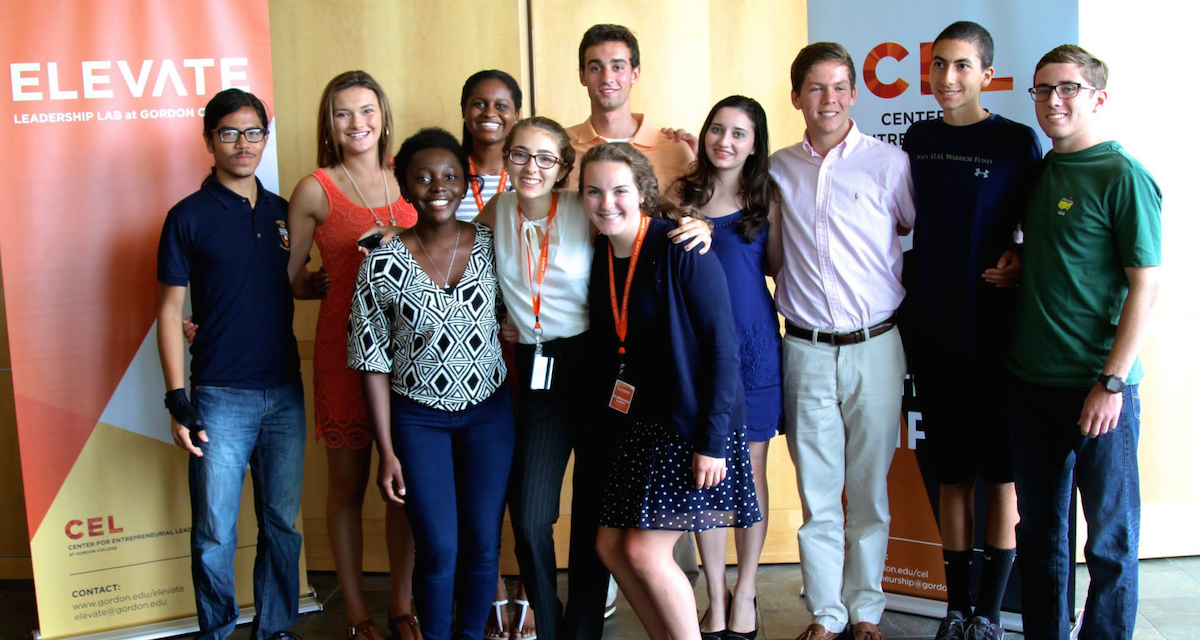Elevate Helps F.E.E.D. Students
Elevate is a weeklong leadership institute for talented high school juniors and seniors. Held at Gordon each summer, the institute draws students from all over the United States and the world to develop their leadership abilities and gain tools to transform real social problems. Participants identify problems in their hometowns, create a solution with their team, and present their plan before a panel of judges. Winning projects receive seed money to get their ventures started. As Gordon gears up for Elevate 2016 (July 24–30), The Bell will feature stories of Elevate alumni who are using their entrepreneurship skills to make a positive impact within their communities.
“I come from a southern family that truly values food, not only as a form of sustenance, but as a conduit for community,” says Julia Canady of Lakeland, Florida. “It’s a language and it’s pretty unique to the south.”
However, she says, “while food is a way of communication, it also needs to be good for you and that’s really important.”
To that end, Julia wanted to start an afterschool club to promote good nutrition in her region, where many people don’t have access to healthy food. When she was nominated to participate in Elevate 2015, the opportunity to turn that idea into action “fell into my lap.” Her idea, F.E.E.D. (Food Education Enhances Diets), was chosen as her team’s focus during Elevate.
“In the impoverished community of Parker Street in Polk County, Florida, there are limited opportunities for students to develop healthy eating habits,” the team’s executive summary explains.
“As a result of this, about 37% of residents in Polk County suffer from obesity, which is 10% higher than the national average. The students who live in Parker Street do not have the resources needed to adopt and maintain a healthy diet.”
Julia and her Elevate team developed plans for F.E.E.D.’s afterschool program, in which students would grow vegetables, learn about nutrition, and gain “healthy cooking skills that last a lifetime.”
Cooking is a way “to communicate how you feel,” she says. Her team’s executive summary incorporated that, with a plan for participants to “cook larger meals to bring home to their families.” F.E.E.D. is about “caring for your body by making healthy, tasty food and equipping people with the tools to do that at a young age,” she explains.
Julia’s sense of mission was encouraged at Elevate, where “everything came back to ‘why are we doing social entrepreneurship?’” A collective purpose led to a strong team bond. “I have never been in a situation where I have learned to grow to love a group of people that quickly,” she says.
Julia’s team created a more detailed plan for F.E.E.D, identifying local assets and possible partners and researching other successful programs. At the end of the week, they won second place—and $1,000 that Julia would use to execute the team’s plan when she returned home.
Connecting with local entrepreneurs has helped her fine tune her original plan to best meet the needs of the Parker Street community, “but the basic mission has stayed the same,” she says: “to truly develop a community around food education that allows students to understand what it means to care about one another through food.”
As Julia has worked to implement the F.E.E.D. plans, support from her Elevate team “was really important,” she says. “I am sometimes overly passionate,” so connecting with peers who “are equally as crazy-passionate, and staying in touch and knowing what’s going on in their lives” has encouraged her.
“I was able to lean on them to push forward. Something I learned is that I can’t do this alone.” Her advice for other young entrepreneurs is to “lean on the wisdom of the people in your community.”
Learn about Elevate 2016 >>
Read about Elevate alumnus Colter Corish >>
Read about Elevate alumnus Branford Barnes >>
Read about Elevate alumnus Matthew Ch’ng>>
By Morgan Clayton ’19, history
Pictured above: Julia (front row, center) with her Elevate team
 The Bell
The Bell